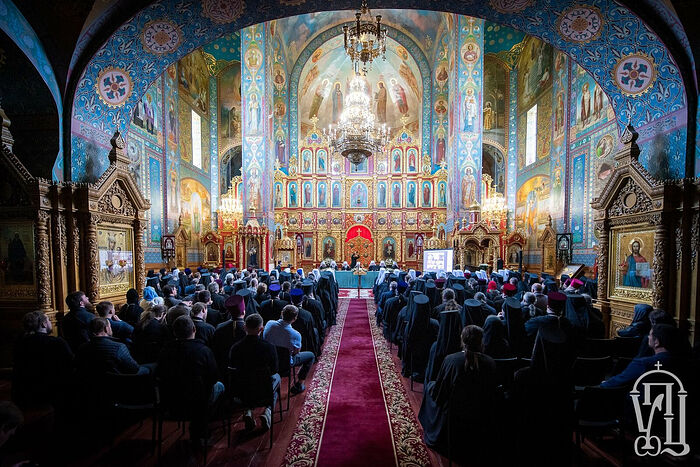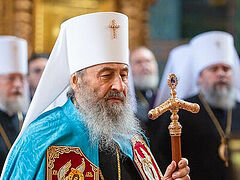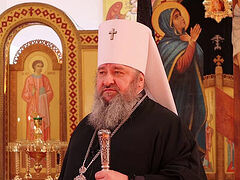Kiev, May 27, 2022
Following this morning’s meeting of the Ukrainian Orthodox Church’s bishops with representatives of the clergy, monastics, and laity, an extraordinary session of the Holy Synod was held, followed by a meeting of the Council of Bishops, which is broader than the Holy Synod, including all hierarchs of the UOC.
Finally, a Council of the Ukrainian Orthodox Church was then held.
A Council is the highest administrative body of the UOC, also consisting of the hierarchs, and clerical, monastic, and lay representatives. While the morning’s meeting was consultative, a Council is empowered to make major decisions affecting the Church’s life.
Among its many duties, the statutes of the Ukrainian Church task a Council of the UOC with:
- “the preservation of the purity and integrity of Orthodox doctrine and norms of Christian morality;”
- “the preservation of the canonical unity of the Ukrainian Orthodox Church, as well as its canonical unity with the Russian Orthodox Church and with all Local Orthodox Churches;”
- “solving fundamental theological, canonical, liturgical, and pastoral issues concerning the life of the Ukrainian Orthodox Church.”
The Council issued a number of resolutions, including a condemnation of the fratricidal war, disagreement with Patriarch Kirill’s position on the war, what’s necessary for there to be any dialogue with the schismatic “Orthodox Church of Ukraine,” and declarations of the increased independence of the UOC.
Notably, the possibility of the UOC making Chrism was discussed. In the Russian tradition, making Chrism is typically seen as one of the foremost signs of autocephaly, although this was not only the case. Chrism was made for centuries in both Moscow and Kiev, and in fact in other diocesan centers. Chrism was last made in the Kiev Caves Lavra in 1913.
The Council ended with memorial prayers for those who have died during war.
The Council’s resolutions read in full:
- The council condemns the war as a violation of God’s commandment Thou shalt not kill! (Ex. 20:13) and expresses its condolences to all those who have suffered in the war.
- The council appeals to the authorities of Ukraine and the authorities of the Russian Federation to continue the negotiation process and search for a strong and reasonable word that could stop the bloodshed.
- We express our disagreement with the position of Patriarch Kirill of Moscow and All Russia regarding the war in Ukraine.
- The Council adopted relevant amendments and additions to the Statutes on the administration of the Ukrainian Orthodox Church, indicating the full autonomy and independence of the Ukrainian Orthodox Church.
- The Council approves the resolutions of the Councils of Bishops of the Ukrainian Orthodox Church and decisions of the Holy Synods of the Ukrainian Orthodox Church that met in the period since the last Council of the Ukrainian Orthodox Church (July 8, 2011). The Council approves the activities of the Chancellery and Synodal institutions of the Ukrainian Orthodox Church.
- The Council considered the restoration of making Chrism in the Ukrainian Orthodox Church.
- During the period of martial law, when relations between dioceses and the central Church leadership are complicated or absent, the Council considers it expedient to grant diocesan bishops the right to independently make decisions on certain issues of diocesan life that fall within the competence of the Holy Synod or the primate of the Ukrainian Orthodox Church, with the subsequent informing of the hierarchy, when the opportunity is restored.
- Recently, our Church has faced a particularly acute new pastoral challenge. During the three months of the war, more than 6 million Ukrainian citizens were forced to go abroad. These are mainly Ukrainians from the southern, eastern, and central provinces of Ukraine. A significant part of them are believers of the Ukrainian Orthodox Church. Therefore, the Kiev Metropolitanate of the Ukrainian Orthodox Church receives appeals from different countries with requests to open Ukrainian Orthodox parishes. It’s obvious that many of our compatriots will return to their homeland, but many will remain for permanent residence abroad. In this regard, the Council expresses its deep conviction that the Ukrainian Orthodox Church cannot leave its faithful without spiritual care, must be close to them in their trials, and organize church communities in the diaspora. It’s necessary to further develop the mission abroad among Orthodox Ukrainians in order to preserve their faith, culture, language, and Orthodox identity.
- Realizing its special responsibility to God, the Council expresses its deep regret over the lack of unity in Ukrainian Orthodoxy. It’s particularly disappointing that the recent actions of the Patriarch of Constantinople in Ukraine, which resulted in the formation of the “Orthodox Church of Ukraine,” only deepened misunderstandings and led to physical confrontation. But even in such crisis circumstances, the Council doesn’t lose hope for the resumption of dialogue. In order for the dialogue to take place, representatives of the OCU need to:
- stop the forcible seizures of churches and forced transfers of parishes of the Ukrainian Orthodox Church.
- realize that their canonical status, as it is fixed in the “Statutes of the Orthodox Church of Ukraine,” is actually not autocephalous and is significantly inferior to the freedoms and opportunities in the implementation of Church activities provided for in the Statutes on the administration of the Ukrainian Orthodox Church.
- to resolve the issue of the canonicity of the OCU hierarchy, because for the Ukrainian Orthodox Church, as for most Local Orthodox Churches, it’s quite obvious that in order to recognize the canonicity of the OCU hierarchy, it’s necessary to restore the Apostolic Succession of its bishops.
The Council expresses its deep conviction that the key to the success of the dialogue mustn’t be only a desire to restore Church unity, but also a sincere desire to build one’s life on the principles of Christian conscience and moral purity.
10. Summing up the results of the work carried out, the Council offers a prayer of thanksgiving to the merciful Lord for the opportunity for fraternal communion and expresses hope for an end to the war and the reconciliation of the warring parties. According to the Holy Apostle and Evangelist John the theologian, may we all, especially our brothers and sisters in the Risen Christ, have grace … mercy, and peace, from God the Father, and from the Lord Jesus Christ, the Son of the Father, in truth and love (2 Jn. 1:3).
While the resolutions don’t specify how the UOC statutes were amended to reflect its full independence (§4), Archpriest Nikolai Danilevich, Deputy Head of the UOC’s Department for External Church Relations, comments:
The UOC disassociated itself from the Moscow Patriarchate and confirmed its independent status, and made appropriate changes to its statutes.
All references to the connection of the UOC with the Russian Orthodox Church have been removed from the statutes. In fact, in their content, the UOC statutes are now those of an autocephalous Church.
It’s unclear to what degree Fr. Nikolai’s comments are to be taken literally. Recall that according to the statutes of the Russian Orthodox Church, only a Local Council of the Russian Church, which consists of bishops plus clerical, monastic, and lay representatives, can grant autocephaly to a Church body within the Russian Church. When the Ukrainian Holy Synod decided earlier this month to hold a meeting of the bishops, clerics, monastics, and laity, it specified that “the discussion on this or that issue should not lead to going beyond the canonical field and should not lead to new divisions in the Church of Christ.”
Follow OrthoChristian on Twitter, Vkontakte, Telegram, WhatsApp, MeWe, and Gab!




